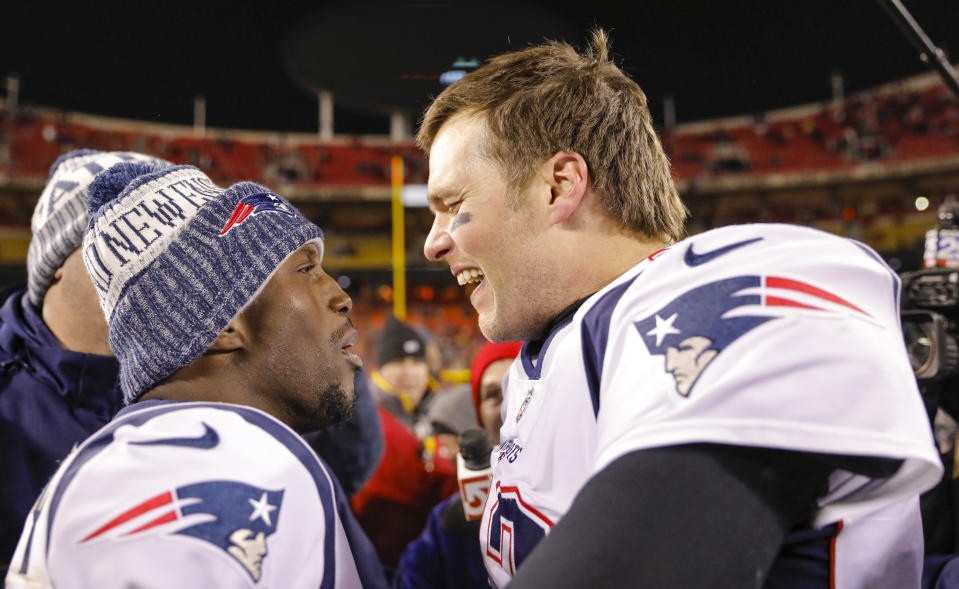By saying he doesn't see race, Tom Brady acknowledges his privilege to be indifferent
While Tom Brady’s appearance on “The Howard Stern Show” Wednesday morning had some of the bland fare Brady has frequently offered to media — he wouldn’t name his favorite receiver he has played with, reasoning that it would be like picking a favorite son — there were glimpses into Brady that we’ve never gotten before.
Brady has long had slip-ups in front of cameras in terms of curse words, but in two hours with Stern, he didn’t have to hold back.
In addition to a story about an injury he suffered that led to one of his testicles swelling to the size of an orange, he also revealed that he began missing OTAs because his wife was unhappy carrying so much of the load in their family life.
Great entertainment.
When Stern asked Brady about his friendship with President Donald Trump, whom Brady said he first met years ago during the New England Patriots’ first Super Bowl run and whether any of his teammates have expressed anger with him about that relationship, Brady said no, because his teammates know him.
“I never saw race,” Brady said. “I think sports transcends race. It transcends wealth. It transcends all that. You get to know and appreciate what someone else may bring. When you’re in a locker room with 50 guys, you don’t think about race because you’re all in the same boat at that point.”

This is an incredibly privileged statement. Not privilege as defined by wealth, but the privilege of being a white man in America and never having to deal with or possibly even consider the things that his black teammates, many of whom Brady would readily refer to as friends, deal with every day.
It’s also wrong.
It doesn’t make Brady a bad person, it just seems that he hasn’t taken the time to educate himself on the reality of life for black Americans or feels empty statements that seem to say “I’m not a racist” are good enough. And he’s certainly not the first person to say they don’t see race. (To be clear: This is not to say Brady is racist.)
The second half of Brady’s statement is more or less true: On a football team, on any sporting team at the college or professional level, there are athletes of all backgrounds, who worship in different ways or not at all, who look different from one another but are all working together toward a common cause.
What that means is they’re able to put aside those differences for the time required to practice and compete together.
As we’re seeing with some coaches and front-office types, those in football exist in a bubble that doesn’t often allow the rest of the world’s concerns inside. Take Baltimore Ravens coach John Harbaugh, who’s afraid of cybersecurity breaches as an online draft approaches despite being part of a multi-billion dollar organization that has an in-house IT staff able to buy the best cybersecurity available, or Oklahoma State’s Mike Gundy, who wants players to ignore Big 12 rules and basic medical science to start spring practice on May 1 because he thinks they’re young and can’t get sick from the coronavirus.
But it doesn’t mean those things, certainly not race, disappear.
At its very essence, saying you don’t see race means you’re not seeing people for who they fully are. You can no sooner say you don’t recognize the rich tones of brown skin than say you can’t see whether they’re bald or have deadlocks, whether they’re 5-foot-6 or 6-6.
Race is an inextricable part of who we are as human beings, and in this country, being black comes with 400 years of deliberate, structural, ongoing inequality.
Black Americans don’t want to not be seen as black — we want negative and damaging prejudicial thoughts and actions based on race to disappear. The elimination of the type of structural inequities that lead to the median wealth of white families in Boston, where Brady lived for years, being $250,000 and the median wealth of black families in the city being $8 (that’s not a typo, as the Boston Globe reported).
Did Brady take no interest in the work his now-former teammates Devin and Jason McCourty, Duron Harmon and Matthew Slater did in Massachusetts, fighting for education equality and juvenile justice reform, areas that data show overwhelmingly negatively impact black children?
Those are men he was with in the locker room for years, men who know firsthand that the money they’ve earned as NFL players doesn’t erase the fact they’re still black men.
Some conversations with them might have helped Brady’s understanding.
If you were 6-foot-6 and were living with someone 5-6, would you continually put necessary things on the highest kitchen shelves, where they couldn’t reach them? On a basic level, that’s the continued inequality black Americans face, from the long-lasting effects of redlining to present-day voter suppression and a host of issues in between.
That’s what Brady and others won’t acknowledge when they say they don’t see color.
If the intention is to say that you do your level best to treat teammates the same no matter their skin color, say that.
But claiming you’re blind to race is to say that you’re indifferent to the experiences of those you claim to be in the same boat with.
More from Yahoo Sports:


